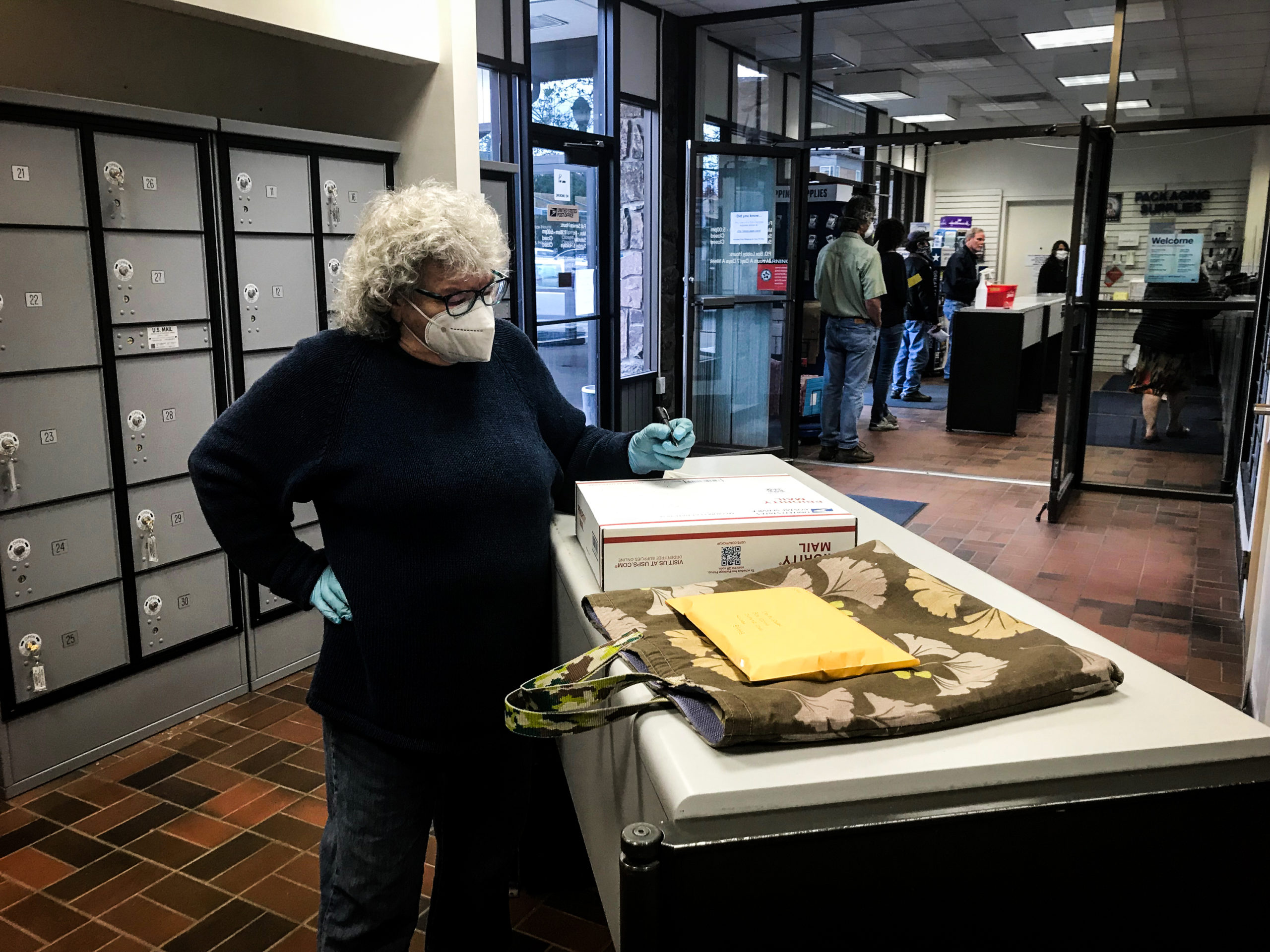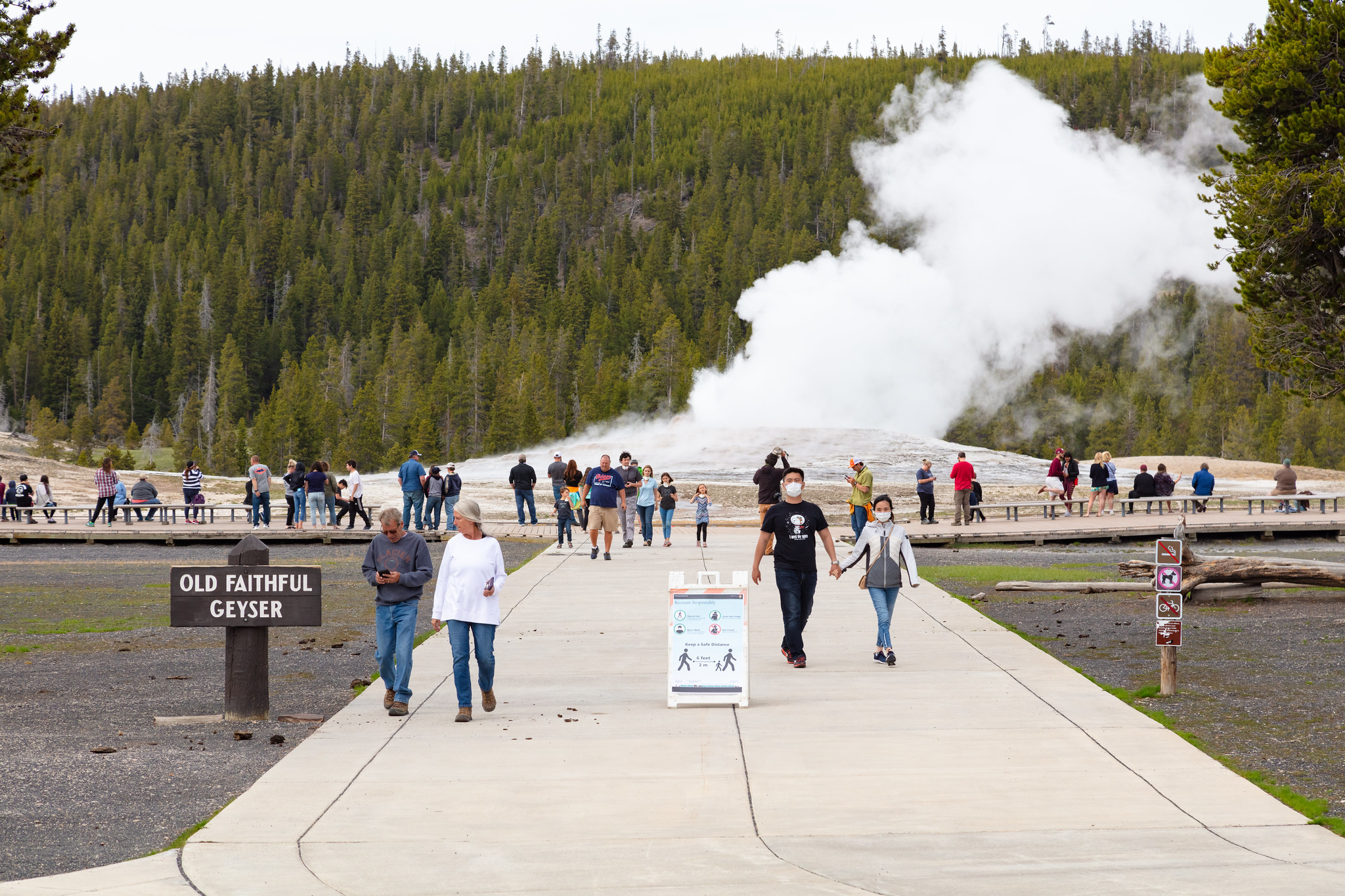A small number of vocal Americans are politicizing, weaponizing even, what they say is their right to forgo wearing mouth coverings.
Several nationwide surveys, including one surveying more than 22,000 people in all 50 states, have found that the majority of Americans support CDC guidelines encouraging all people to wear masks in public. Growing scientific evidence shows mouth coverings slow the spread of COVID-19, but some folks say wearing a mask infringes on their freedom.
Disturbing videos circulating on social media capture some of their fury.
A compilation posted to Twitter depicted people coughing into the faces of clerks as they tried to enforce store policies that require shoppers to wear masks.
Other customers grew violent. One woman lunged at a store clerk. “You refuse me service because you are just stupid, you are so stupid!” she shouted.
At Costco, all people who walk through the double sliding doors must wear masks, a policy that has spurred some to boycott the big-box retailer. One irate customer in Colorado filmed his confrontation in a video that has since gone viral. He asked the Costco staffer to explain to his “3,000 followers” on Instagram why the man wasn’t allowed in the store.
The shopper pointed his camera phone at the unflinching clerk.
“Hi everyone,” the employee said, waving his hand. “I work for Costco and I’m asking this person to wear a mask because that’s our company policy, so you either wear the mask or—”
The shopper interjected: “And I’m not doing it because I woke up in a free country!”
Things did not end well for the man. The employee confiscated his cart and kicked him out of the store.
Such resistance can be traced all the way to the top—President Donald Trump and Vice President Mike Pence have refused to wear masks in public defying the health guidelines issued by their own administration.
Reports of mask-fueled hysteria and confrontations have yet to surface in Jackson Hole, where wearing masks is voluntary and only a handful of businesses have announced policies requiring customers to wear mouth coverings in their establishments.
But as travelers pour in, some are watching unmasked crowds, from Town Square to the national parks, with rising anxiety.
During its reopening last week, Yellowstone National Park reported healthy visitation numbers Monday through Wednesday. The park was at 60 to 90 percent of “normal” at the entrances near Jackson and Cody respectively. Memorial Day weekend numbers on Sunday and Monday at both entrances were even closer to pre-COVID figures at 97 percent compared to 2019.
But masks were largely excluded from this nature lovers equation.
“Park staff observed limited use of masks in outdoor areas,” reads a Yellowstone press release issued May 21.
Visitors uncomfortable with the dearth of mouth coverings are out of luck. Such folks should plan their visit for another time or avoid situations where they are around visitors who are not following health recommendations, Cam Sholly, Yellowstone superintendent, said in the press release.
“While we are taking many actions to mitigate health concerns, including widespread messaging, signage, and direct public interface, the National Park Service in Yellowstone will not be actively telling citizens to spread out and put masks on, especially outdoors,” Sholly said. “While we recommend it, per CDC guidelines, primarily in areas where social distancing cannot be adhered to, we will not be enforcing the wearing of masks in outdoor areas.”
Unmasking the Evidence
Back in Jackson at a Teton District Board of Health meeting, county health officer Dr. Travis Riddell had different feelings. For more than one month, he and health department officials have been contemplating the idea of a health order that would mandate all people to wear masks in certain places in Teton County.
Cases of the novel coronavirus plateaued here weeks ago with numbers hovering around 69 confirmed and 31 probable cases. The valley has reported one death and 97 recoveries, but Riddell remains concerned about a resurgence. More people gathering in groups and more visitors arriving from places such as New York, the U.S. epicenter of the virus, means “there’s a high likelihood” that cases could sharply increase.
If that happened, Riddell said Jackson is more prepared than it was in early March. The hospital’s capacity, testing capacity and contact tracing are vastly improved, he said. “So we do have tools to manage an increase.”
The question, Riddell said, is whether health orders would again be necessary to prevent a worst-case scenario. Directives Riddell issued in March and April, combined with the valley’s delayed positioning on the epidemic curve, could have spared Teton County from an explosion of COVID cases.
Riddell said he is closely following the data and medical literature on masks. “People often ask, ‘what’s changed? Why weren’t we talking about masks in early March and why are we talking so much about masks now?’”
For one, our understanding of who exactly is transmitting the virus to others has shifted. Riddell pointed to multiple studies showing a sizable portion of people who contract the novel coronavirus are asymptomatic.
“Depending on which study you read, anywhere from 40 to 80 percent of people are asymptomatic at the time of testing,” he said. “So those are people who are out and about and have no idea that they’re sick. And those are the people who should be wearing masks.”
The notion behind a mouth covering is “source control,” meaning it is most effective at preventing the person who is wearing it from spreading disease to other people. This is particularly important for all those asymptomatic carriers. (Cloth mouth coverings and many of the masks used by the public differ from the N95 masks that health care providers use. They act as respirators for the people wearing them, filtering large and small particles.)

Laurel Wicks doesn’t leave home without her mask and gloves. She was among the 75 percent of people wearing masks at the Pearl Street post office on a recent Tuesday. (Robyn Vincent/KHOL)
Riddell said the other new information about masks is droplet transmission. Growing research indicates cloth mouth coverings are effective in preventing the spread of COVID-19 by catching the large droplets we release into the air when we breathe and talk.
A person who is pre-symptomatic or asymptomatic, then, and breathing normally is “broadcasting these larger droplets” and that mask creates a barrier, stopping them from flying into the air, reaching other people and causing infection.
Scientists continue to study different transmission methods and preventative measures. Research published May 22 suggests cloth mouth coverings, “particularly those with several layers,” may be effective at not only preventing someone from spreading larger droplets but also smaller droplets known as aerosols, which linger in the air.
But whether Riddell will submit an order to the state mandating all people to wear masks is uncertain. The idea of donning mouth coverings in Jackson Hole has become “quite politically charged,” he said.
“There is a small but incredibly vocal group of people in this community who feel that a requirement to wear masks would be a significant impingement on their personal freedoms.”
Those same folks point to promising local metrics, Riddell said. New cases of the coronavirus have leveled off; Teton County has flattened its curve. So why do we need more restrictive measures?
The Jackson Hole Tea Party, which refers to COVID-19 as the “WuHan Flu,” is at least one group that has decried business closures and social distancing measures enacted to stem the spread of COVID-19. It has called those moves government overreach that can result in “potential punitive actions.” But on the Tea Party’s blog, KOHL did not find a specific critique of face masks.
Riddell said mitigation now, such as the use of mouth coverings to stem the spread of COVID-19, could avert economic ruin later. “If we had such a big surge that we had to close the national parks again, close restaurants again, close other businesses again, during the peak of our tourist season, it would be devastating for a lot of local businesses and our economy.”
Another more damaging blow to the economy isn’t just a financial concern. It is also a public health issue, Riddell said. He pointed to the connection between a person’s sense of financial security and their health and wellbeing.
No Mask, No Entry
Some of the same folks urging Riddell to halt further health orders have also likely been contacting Jackson Whole Grocer. It was one of the first local businesses to announce all people and children over the age of two must wear masks beginning June 1.
Marketing director Lacey Davidson said the store has received a flood of supportive messages and phone calls, but a “small minority” has also contacted the store to protest. Jackson Whole Grocer is undaunted.
“It’s really not political for us,” Davidson said. “It’s about the number of customers that we have.”
Each week, roughly 15,000 customers walk through Jackson Whole Grocer’s doors. The natural foods grocer weeks ago implemented a policy requiring all employees to wear masks. Now with the national parks reopening and an influx of visitors, it was the right time to follow CDC guidelines and require all people to wear masks, Davidson said.
They have most of the logistics worked out, though the policy is evolving. The store will have disposable masks on hand for unmasked shoppers and only those with certain health conditions are exempt from wearing a mask—Jackson Whole Grocer is still considering how to identify such folks so they can shop without raising red flags. Meanwhile, managers will monitor entrances, aisles and spaces throughout the store to ensure people are complying with the policy.
A couple miles down Broadway, Hoback Sports also has a supply of disposable masks for shoppers. The outdoor retailer implemented in March a policy requiring all employees and customers to wear mouth coverings.
Other shops are following suit. Clothing store Habits Jackson Hole announced today that all employees and customers must wear masks.
“This is for your health as well as ours,” an Instagram post reads.
These policies appear geared toward a group that at once nourishes Jackson’s economic vitality and, in the age of COVID shutdowns, potentially endangers it: visitors.
“At least 90 percent, maybe 98 percent, don’t wear masks,” Dr. David Peterson, member of the Teton District Board of Health, said of the influx of tourists.
Riddell agreed. “It seems that some of the social distancing practices we’re promoting are not being widely followed. This is purely one person’s observation, but it appears that many of those people who are not observing them are folks from outside of our community.”






